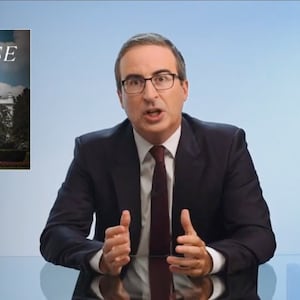George Takei remembers one of his lowest points vividly. It came on November 11, 2017. The Star Trek actor was in Tokyo, Japan, for a gala screening of Allegiance, his Broadway passion project about Japanese internment, when his phone began buzzing like crazy.
“It was right after our screening and we were celebrating, and then… we heard,” he recalls to The Daily Beast. “It was horrible.”
The Hollywood Reporter had just published an eye-opening exposé wherein a former model accused the Star Trek actor and activist of drugging and sexually assaulting him in 1981. Unlike other #MeToo stories, however, the piece didn’t contain much in the way of vetting or corroboration—just a lonely 36-year-old allegation, backed by a few of the accuser’s friends. Takei, who had been outspoken against the alleged sexual abuse of a teenage Anthony Rapp by the actor Kevin Spacey, vehemently denied the charge, saying that the alleged incidents “simply did not occur” and “are so antithetical to my values and my practices.”
Fuel was added to the pyre when, the following day, the president’s eldest (and incredibly online) child, Donald Trump Jr., tweeted that Takei “shouldn’t opine about victims ever again,” unleashing a torrent of abuse on the elderly actor from his army of right-wing trolls. Things got even worse when, on Dec. 9, Don Jr. tweeted at Takei, “I guess you have a bit more free time to read #fakenews now that it’s a bit tougher to ply kids with alcohol to assault them??? You know with all the added scrutiny.”
“We know the source,” says Takei, reflecting on the awful episode with Don Jr. “You know, social media brings out the worst in people. I haven’t got the time to deal with it, because it’s irrelevant. They’re wallowing in evil, as well as lies. It’s malicious lies—not just lying but there to hurt and damage. I just ignore it. So, I’m not aware of so many of the ‘cancel culture’ people.”
The whole ordeal was particularly rich given the way Don Jr. responded when his father was caught on tape bragging about molesting women and accused of sexual harassment or assault by 23 women. He has been one of the most vocal critics of so-called “cancel culture.” When the Observer published a detailed dismantling of the allegation against Takei, with Takei’s accuser claiming he fabricated portions of the story, downplaying the entire encounter as “a great party story,” and ultimately walking back the allegation, no apology came from Don Jr. or anyone on the right who’d so forcefully attempted to “cancel” Takei, as it were.
When I bring up the hypocrisy of it all, Takei channels his trademark wit, launching into an amusing story about his time on The Celebrity Apprentice.
“I was fired by the future president-to-be!” he laughs.
Takei was eliminated after a task that saw teams create a pair of themed window displays at Lord & Taylor for Ivanka Trump’s (flammable) clothing and accessory line. The judges were Ivanka, Don Jr., Eric Trump, and their dad.
“We were in two groups—male and female—and I was the team leader. Each team had two windows of Lord & Taylor on 5th Avenue to decorate, and we had all these goods that had to be displayed,” he remembers. “Arsenio Hall was on my team, and he had the idea to have twin models, where one would walk in one room and be in elegant evening clothes, and then walk out, and the other would walk into the other in casual afternoon clothes. It was classy, it was imaginative, it was creative, it was beautiful. The women’s team, both windows had everything but the kitchen sink in it—hats, shoes, gowns. They were 34th Street and we were Madison Avenue. Ivanka was a judge. She favored the women. I still maintain we were the real elegant, classy windows but she chose the everything-but-the-kitchen sink approach. So I know what their judgment is, what their taste is, and what their bias is.”
“And,” he adds, “particularly coming from that gang, I don’t pay any attention.”
The official “occasion” for our chat is Takei’s latest project: narrating two sci-fi stories by the Hugo-winning author Ken Liu on the audiobook platform Serial Box—Saboteur and Summer Reading. According to Takei, the escapist fare can serve as a tonic of sorts to our current Trumpian hellscape.
“It does seem like doomsday—but doomsday will pass, and come to another future,” says Takei. “In our times, we have a writer like Ken Liu. English is not his first language, and yet he’s able to use his imagination and knowledge of technology to take us to another time.”
For those who feel hopeless right now, Takei cautions that things have been worse in this country. And he should know.
“I’m 83. I’ve lived a lot of life,” he explains. “And what we’re going through now is horrific—I mean, it’s dystopian—but for my parents, it was a cataclysmic thing. I was born right before Pearl Harbor, and overnight after the bombing of Pearl Harbor, we Americans of Japanese ancestry—my mother was born in Sacramento, my father was a San Franciscan—were looked at with suspicion, and fear, and outright hatred. That hatred was a toxic mix of war hysteria and racism, and it swept across the country. Every legislative body, from city councils to state legislatures to the U.S. Congress, just thundered with lock up the Japs! We were innocent and had nothing to do with Pearl Harbor, but they categorized us as ‘enemy aliens.’ I wasn’t an ‘enemy alien’—I was a 5-year-old kid, born in Los Angeles.”

The Takei Family in California
Courtesy George TakeiThe Takei family was rounded up by the U.S. military—forced to leave their home in Arcadia, California, and transported to an internment camp in Rohwer, Arkansas.
“I was 5 years old and I remember the terror of that morning, when my father got me and my brother Henry up very early in the morning, dressed us hurriedly,” recounts Takei. “Suddenly, we saw two soldiers marching up our driveway. They carried rifles with shiny bayonets on them. They were stomping with force, and with their fists began pounding on our door. My father came out of his bedroom, answered the door, and we were ordered out of our home—literally at gunpoint. It was terrorizing. And I lived through that.”
Between ICE’s migrant detention centers imprisoning forcibly separated children, President Trump announcing a “patriotic education” commission, and Attorney General William Barr saying that the COVID-19 lockdowns represented “the biggest intrusion on civil liberties” in America outside of slavery, Takei sees chilling echoes of that which he experienced in the 1940s.
“I use the word ‘concentration camp’ because a dictionary definition of ‘concentration camp’ is when a group of people who share something in common—either race, faith or orientation—are imprisoned or concentrated all together for a political purpose,” he says of the migrant detention centers. “That’s precisely what happened to us Japanese Americans. There were barbed wire fences, sentry towers, machine guns pointed at us. Then, a year into imprisonment, they came down demanding loyalty. Isn’t that outrageous?”

The only photo of George Takei taken at Rohwer Internment Camp
Courtesy George TakeiTakei will never forget the “two critical questions” that the U.S. government asked of Japanese Americans on their loyalty questionnaire—after taking everything from them, including their bank accounts, their homes, their businesses, and their freedom.
<p><i>Question 27: “Will you bear arms to defend the United States of America?” and Question</i><i>Question 28: “Will you swear your loyalty to the United States of America and forswear your loyalty to the Emperor of Japan?”</i></p>
“The Emperor of Japan? We’re Americans!” exclaimed Takei. “For the government to presume that we have an inborn racial loyalty to the emperor was offensive,” so Takei’s parents refused, and the family was subsequently branded “disloyal” and sent to a more “notorious” internment camp, the Tule Lake War Relocation Center in rural California.
While Takei marvels at the strength of his parents’ refusal to debase themselves, he also has endless admiration for the thousands of brave men and women who answered “yes,” swallowed their pride, and enlisted in the U.S. military to help them win World War II.
“The men were sent to the battlefields of Europe and used as cannon fodder, with wave after wave getting mowed down. And yet, they fought with incredible courage and heroism,” says Takei. “That unit, the 442nd Regimental Combat Team, sustained the highest combat casualties of any unit in the Second World War, and when the war ended, they came back as the most decorated unit of them all. They were welcomed back on the White House lawn by President Harry Truman who said, ‘You fought not only the enemy, but you fought prejudice—and you have won.’”

George Takei and the cast take a bow at the closing curtain of Allegiance during the Broadway opening night at The Longacre Theatre on November 8, 2015, in New York City.
Neilson Barnard/GettyTheir valor, of course, stands in sharp contrast to that of the current president, who dodged the Vietnam draft thanks to his supposed bone spurs.
“Bone spurs!” chuckles Takei. “I didn’t know what a bone spur was until he claimed that!”
The big takeaway of Takei’s story, it seems, is to never lose faith—or give up the fight.
“Our internment did pass, and my father educated me on what it meant, and what we gotta do,” Takei tells me over Zoom.
Takei became a successful actor, thanks in large part to his iconic role as Hikaru Sulu, helmsman of the USS Enterprise on the television series Star Trek (and in subsequent films), a cultural icon (via his reality TV appearances and enormous social media presence), and an ardent social justice activist, first earning a handshake from Martin Luther King Jr. while a student campaigning for the rights of African Americans at UCLA, and later joining a Hollywood activist group, Entertainment Industry for Peace and Justice, where he worked alongside Jane Fonda and Donald Sutherland to organize rallies for various causes.
“With Breonna Taylor and George Floyd and Black Lives Matter, it’s horrific,” Takei says of the police brutalizing Black bodies. “That the president can summon soldiers and equipment and mounted police to the streets?”
There is also the ongoing COVID-19 pandemic that has claimed 210,000 American lives (and counting). Takei—along with his longtime partner Brad—has been keeping his spirits up with daily walks through Hancock Park in Los Angeles, and binge-watching The Tudors (he’s a huge Anglophile and was named after King George VI).
Toward the end of our talk, he returns to that dark period—the allegation, the tweets, the harassment—offering it up as an example for a light at the end of the tunnel.
“It was devastating, but we were able to emerge from that,” he says. “And we can emerge from this too.”
He pauses, before unleashing a big smile. “To use Gene Roddenberry’s wonderful way of greeting: Live long and prosper. But it’s also a great social distancing gesture! Both a good idea and keeping you at bay.”



